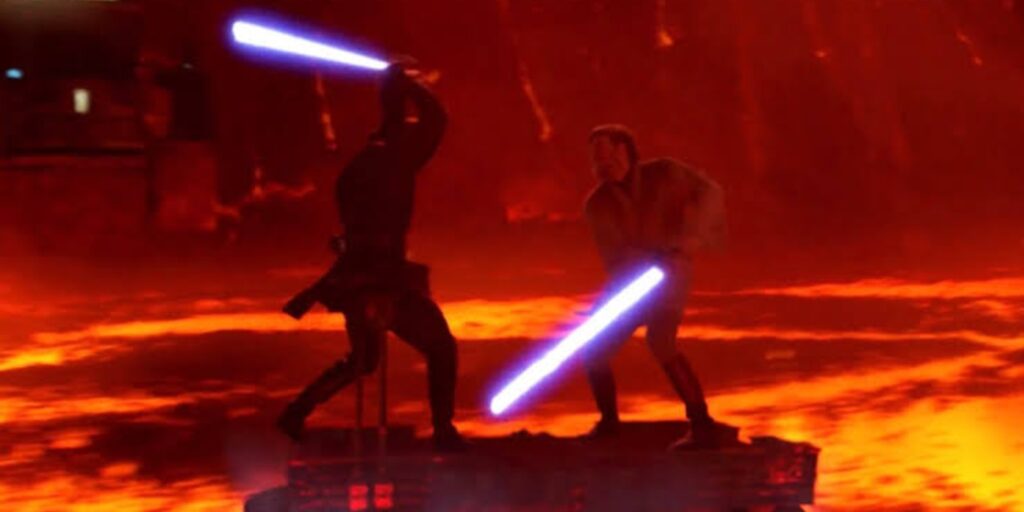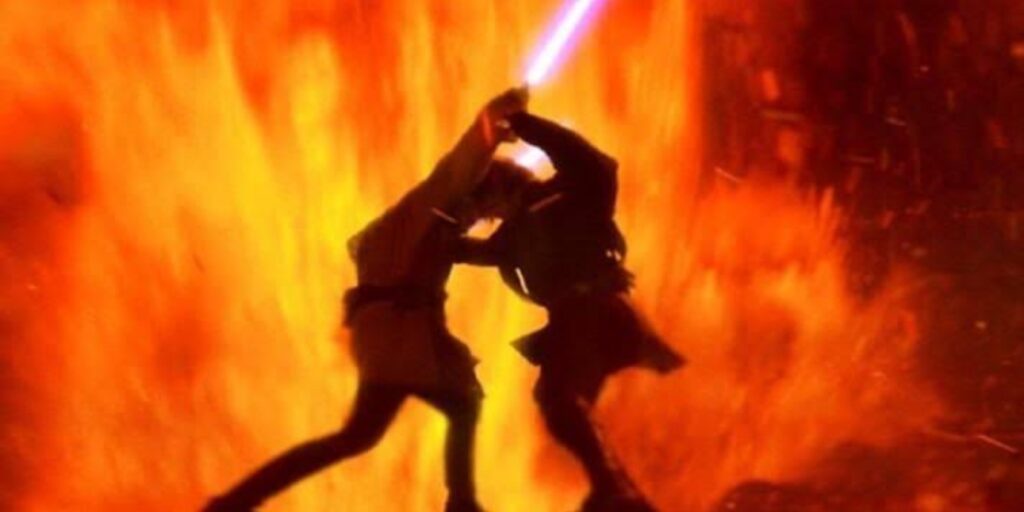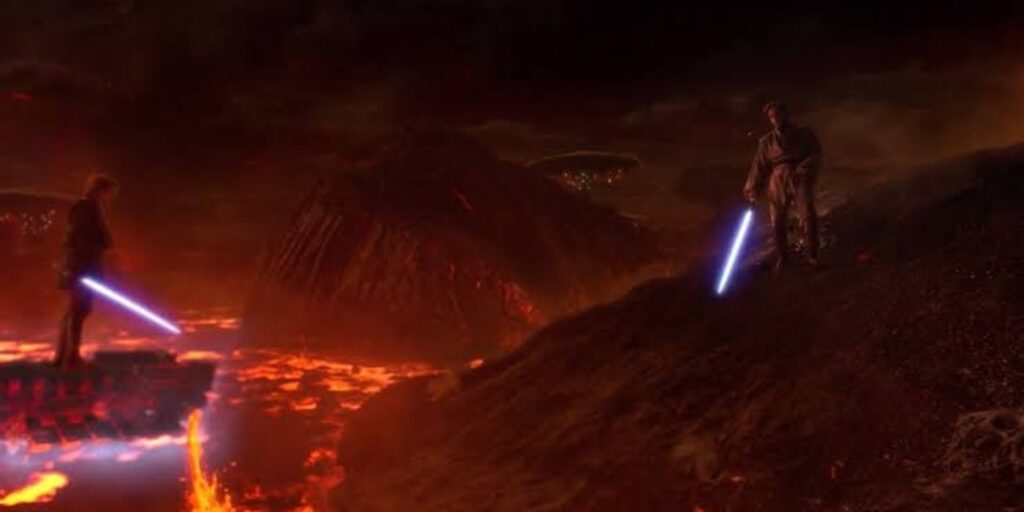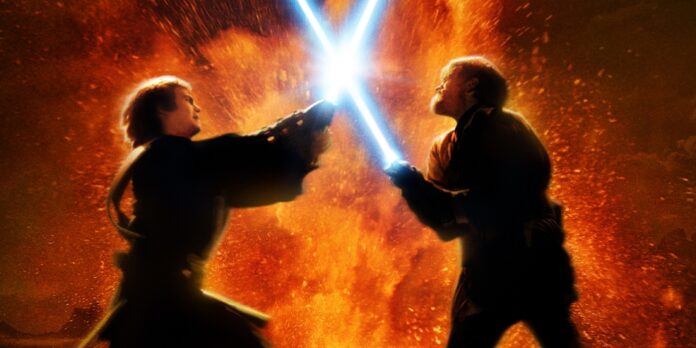The ‘Star Wars‘ saga is as rich as it gets when it comes to complex relationships. However, few are as emotionally charged and tragic as the one between Anakin Skywalker and Obi-Wan Kenobi. Their iconic duel on Mustafar in Revenge of the Sith was seen as the ultimate clash.
Yet, as revealed in ‘Darth Vader’ (2015) by Kieron Gillen and Salvador Larroca, Anakin’s vision of how that battle should have ended adds a devastating new layer to the story. It adds a lot more about Vader’s shattered soul.
Vader Didn’t Want To Survive Mustafar

In the imagined sequence conjured by Darth Vader his life support suit is temporarily shut down by Cylo. We’re shown a version of Mustafar that’s far more emotional than the canon portrayal. Rather than ending in hatred and fire, Anakin sees the duel ending in a final plea to Obi-Wan, a desperate wish for mercy. In this alternate memory, Anakin begs Obi-Wan to kill him.
He believes that if his former master truly loved him, he would end his life rather than let him become a tool of the Sith. This reimagined ending is haunting. It shows that Anakin, even after all the atrocities he committed, longed for an end that preserved some piece of his humanity. He didn’t want to be saved, he wanted to be spared.
Additionally, it’s clear that this was not out of weakness; he just didn’t want to be a part of what was coming. In his twisted perception, death at the hands of Obi-Wan would have been the most loving and merciful act imaginable. Instead, Obi-Wan walked away, leaving Anakin to suffer physically and spiritually. For Anakin, love meant sacrifice.
He saw death as the only path to stop himself from becoming the monster he feared. In his dying hallucination, Obi-Wan lifts him and throws him into the lava, not in rage, but in mercy. It’s completely against Obi-Wan’s character, which is why it could only happen within Vader’s mind. However, it also speaks volumes about Anakin’s inner torment.
The Duel Meant More To Vader Than Anyone Knew

What follows in Vader’s hallucination is even more symbolic. Out of the flames, Vader rises again. This time, with full power and terrifying clarity. He immediately slays the imagined Obi-Wan. But he is met not with triumph, but with confrontation by Anakin. The two engage in a battle that is clearly metaphorical: the war within Vader himself.
Anakin fights with conviction, attempting to avenge Obi-Wan to destroy the darkness he has become. However, he is no match for Vader. Still, Anakin does not die. He screams, “I hate you!” But this time, it isn’t directed at Obi-Wan; it’s Anakin hating Vader. This moment of self-loathing encapsulates the entire tragedy of Darth Vader.
He has spent decades convincing himself that Anakin Skywalker is dead. But Anakin won’t go quietly. No matter how deep Vader dives into darkness, he cannot sever the ties of love, regret, and pain that define Anakin Skywalker. That’s why, deep down, Vader never truly stopped loving Padmé.
And, that’s why his pursuit of Luke is driven more by love than power. Luke is a living remnant of the man Vader once was. He is a symbol of the uncorrupted love between Anakin and Padmé. It’s also why, despite everything, Vader saves Luke in Return of the Jedi. Because Anakin Skywalker never really died.
The Real Tragedy Of Obi-Wan Kenobi’s Choice

The heartbreaking truth is that Anakin didn’t want to be Vader. He wanted Obi-Wan to save him by ending his suffering. It’s a gut-wrenching twist to an already emotional moment. It further reveals the unbearable weight on Obi-Wan’s shoulders. Could he have killed Anakin if asked? Probably not. And that’s the true tragedy.
In case you missed it: Ryan Gosling To Reportedly Lead Shawn Levy’s Experimental ‘Star Wars’ Film
For all of Obi-Wan’s strength and devotion to the Jedi Code, his bond with Anakin was too deep. He saw Anakin as his brother, even as his son in many ways. And that love made him hesitate. That hesitation left Anakin to be remade as a tool of tyranny. Vader’s hate for Obi-Wan wasn’t just about their fight, it was about that choice. In Anakin’s eyes, Obi-Wan failed the ultimate test of love.
And while that’s not fair, it’s understandable. It’s the cry of someone who wished his fate had been sealed by someone he trusted. In the end, ‘Darth Vader (2015)’ doesn’t just explore a what-if scenario; it goes into an emotional deep dive. Beneath everything, Vader is still the broken man, forever haunted by the one choice that might have saved him.





